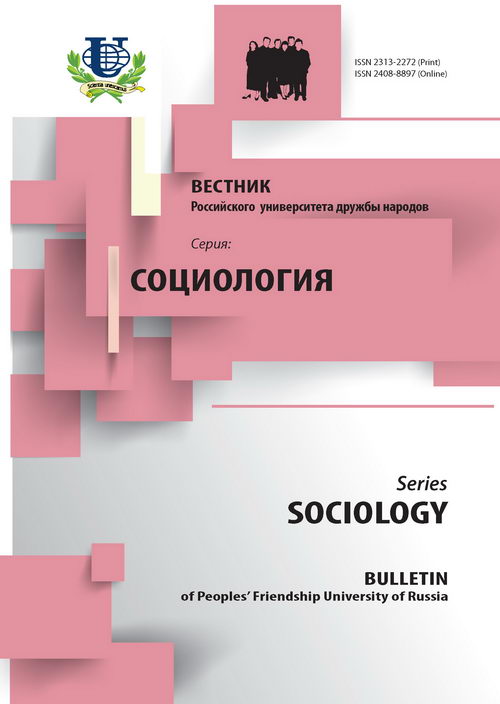Поп-культура как фактор социализации: возможности эмпирического анализа
- Авторы: Троцук И.В.1, Карпова А.М.1
-
Учреждения:
- Российский университет дружбы народов
- Выпуск: № 1 (2010)
- Страницы: 96-107
- Раздел: Статьи
- URL: https://journals.rudn.ru/sociology/article/view/6324
- ID: 6324
Цитировать
Полный текст
Аннотация
В статье систематизировано предметное поле социологических исследований популярной культуры на теоретическом и эмпирическом уровнях анализа. В первом случае речь идет о дефинициях поп-культуры в сопоставлении с близким ей понятием массовой культуры, междисциплинарных попытках концептуализации поп-культурной проблематики, выделении функций поп-культуры и обозначении ее социализационных возможностей - как позитивных, так и негативных. На эмпирическом уровне перечисленные вопросы рассматриваются крайне редко: обычно в социологический инструментарий включаются лишь тематические блоки по досуговым предпочтениям и ценностным ориентациям молодежи, призванные зачастую подтвердить негативные оценки воздействия телевизионной продукции на социализацию. Авторы предлагают иной фокус эмпирического рассмотрения поп-культурного воздействия - анализ идентификационных моделей, представленных в «текстах» поп-культуры - и приводят пример реализации подобного подхода (контент-анализ молодежного журнала «Молоток»).
Об авторах
Ирина Владимировна Троцук
Российский университет дружбы народов
Автор, ответственный за переписку.
Email: irina.trotsuk@yandex.ru
Кафедра социологии; Российский университет дружбы народов
Анастасия Михайловна Карпова
Российский университет дружбы народов
Email: rudn@rudn.ru
Кафедра социологии; Российский университет дружбы народов
Список литературы
- Бодрийяр Ж. Общество потребления. Его мифы и структуры. - М.: Культурная революция; Республика, 2006.
- Дроздов А.Ю. «Агрессивное» телевидение: социально-психологический анализ феномена // Социологические исследования. - 2001. - № 8.
- Иваненков С.П. Актуальные проблемы социализации молодежи // Credo New. Теоретический философский журнал. - 1997. - № 3.
- Климов И.А. Социальные вызовы «приватизированного» телевидения // bd.fom.ru/report/ map/gur050401.
- Костина А.В. Массовая культура как феномен постиндустриального общества. - М.: КомКнига, 2006.
- Мукерджи Ч., Шадсон М. Новый взгляд на поп-культуру // sociologs.nm.ru/articles/ mukerji_schudson_01.htm.
- Ортега-и-Гассет Х. Восстание масс. - М.: АСТ, 2001.
- Петухов В. Деградация нравов или вербализация страхов? // wciom.com/arkhiv/tematicheskii-arkhiv/item/single/1702.html.
- Осипов Г.В. Социологический энциклопедический словарь. - М.: Норма, 2000.
- Поп-культура начала третьего тысячелетия // Культура. - 2000. - № 33.
- Лоусон Т., Гэррод Д. Социология. А-Я: Словарь-справочник. - М.: ФАИР-ПРЕСС, 2000.
- Рашкофф Д. Медиавирус. Как поп-культура тайно воздействует на ваше сознание. - М.: Ультра. Культура, 2003.
- Силласте Г.Г. Влияние СМИ на жизненные планы сельской учащейся молодежи // Социологические исследования. - 2004. - № 12.
- Хоркхаймер М., Адорно Т. Диалектика просвещения. - М., СПб.: Медиум-Ювента, 1997.
- Щеглова С.Н. «Своя» комната как артефакт молодежной субкультуры // Социологические исследования. - 2003. - № 3.
- Baker S.L. Pop in(to) the bedroom: popular music in pre-teen girls' bedroom culture // European journal of cultural studies. - 2004. - № 7.
- Callahan J.L., Rosser M.H. Pop goes the program: using popular culture artifacts to educate leaders // Advances in developing human resources. - 2007. - № 9.
- Dolfsma W. Consuming pop-music/constructing a life world: the advent of pop-music // International journal of cultural studies. - 2004. - № 7.
- Jönsson A. TV - a threat or a complement to school? // International communication gazette. - 1986. - № 37.
- Tetzlaff D.J. MTV and the politics of postmodern pop // Journal of communication inquiry. - 1986. - № 10.
Дополнительные файлы













